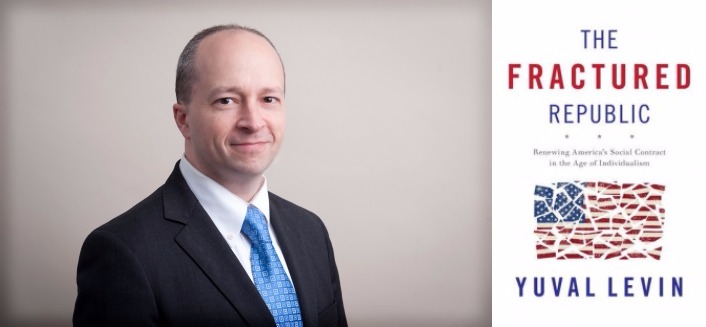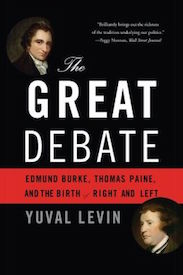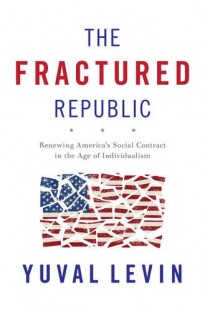The Great Debate: Edmund Burke, Thomas Paine, and the Birth of Right and Left
Americans know Tom Paine best for “Common Sense,” with its legendary assault on monarchy and its liberating call for independence. Arguably the Edmund Burke whom we should know best was the brilliant parliamentary critic of the many errors the British government committed in America before 1776. There is no sharper assessment of everything George III and his ministers were getting wrong about America than Burke’s famous March 1775 speech for reconciliation.
Yet the Paine and Burke who matter most to the conservative journalist Yuval Levin owe their interest to another revolution, the upheaval that erupted in France in July 1789. With remarkable prescience, Burke’s “Reflections on the Revolution in France” denounced the destructive tendencies the French seemed bound to release. In direct response, Paine published “Rights of Man,” in two volumes, in March 1791 and February 1792. For English-speaking readers, these works framed the basic debate over the French Revolution that dominated politics and political thinking on both sides of the Atlantic for the next decade and longer.
It is easy to characterize this epochal debate as either a response to the events in France or a warning to future generations about the alarm and allure of revolutions. Levin has a different agenda. In his view, this dispute was less a reaction to mere history, even in the grand form of a mass revolution, than a powerful reflection of underlying and influential political philosophies. Levin’s main concern is to explain what those philosophies were, to contrast Burke’s prudent conservatism with Paine’s radical egalitarianism and to demonstrate how deeply rooted these ideas were in each writer’s thinking. But Levin has a second motif. He also wants to suggest that the philosophical sources of the quarrel between Burke and Paine set the foundation for the political disputes that have vexed us ever since.
Readers familiar with Levin’s journalism at the National Review and National Affairs will not be surprised that Burke emerges as the more attractive and textured thinker. Of course, Burke ranks atop the curious cluster of thinkers and doers whom conservatives most admire, along with Winston Churchill, Ayn Rand and Friedrich Hayek . Burke embodies that great virtue of prudence that conservatives want their statesmen to cultivate. He is ever attuned to the complexities of history and circumstance. Even when minded toward reform — as Levin’s Burke manifestly is — he remains wary of the dangers of radical innovation driven purely by principle.
Paine, by contrast, inevitably appears as something of a political simpleton. Driven by powerful commitments to universal rights and equality, he professedly wants to make the world anew, casting monarchy and aristocracy on the dust-heap where they belong.
Yet Levin’s treatment of his two figures is quite measured. “The Great Debate” originated as his doctoral dissertation at the University of Chicago’s rightward-leaning Committee on Social Thought, a project interrupted by his service in the George W. Bush White House and ensuing think tank and journalistic opportunities. The book is addressed to enlightened lay readers rather than conservative enthusiasts, and its architecture is clever and intellectually persuasive.
Levin arrays the differences between Burke and Paine as a set of six sharp disagreements over basic political ideas, each of which he examines with some care. This opposition begins with a dispute over the relevant authority of nature and history. Paine’s radically free individual, the modern democratic citizen, derives his rights from a situation that precedes the formation of a society; Burke’s subject is always embedded in a matrix of institutions, customs and affections. To allow mankind to attain the rights that originate in nature, Paine makes justice a supreme value. For Burke, what Americans sometimes call “ordered liberty” remains the proper goal. That difference leads naturally to the recognition that Paine favors a political realm emphasizing continual choice, Burke one that emphasizes the duties that ultimately hold society together.
In his most ambitious chapter, Levin contrasts Paine’s absolute confidence in the working of human reason, the supreme good of the 18th-century Enlightenment, with Burke’s concept of “prescription,” a skeptical preference for settled mechanisms of behavior that requires reform to follow a moderate path, ever conscious of the dangers of unintended consequences. The comparison ends with two predictable topics. Paine favors revolution and the rights of the living generation, Burke opts for careful reform and a sense of generational continuity.
This bare summary hardly does justice to Levin’s analysis. Much of his argument is familiar, and the book grows a bit repetitive, but “The Great Debate” remains a thoughtful introduction to this famous paradigmatic opposition. There is, however, one other opposition, or fault line, that frames this book, and here Levin makes a far less persuasive case.
This fault line lies between those who interpret politics philosophically and those who see it historically. There is no doubt where Levin’s perspective lies. History matters, Levin concedes, but in this case it is not determinative. His Burke and Paine held remarkably consistent views throughout their lives. The French Revolution was more the occasion for their famous controversy than its cause.
It is when Levin turns to our own time that the weakness in his position becomes evident. As a student of the history of ideas, he wants us to believe that the works of great writers actively shape the political choices we make. In some sense, to some extent, this is true. Think of the woeful impact that the fictional musings of Ayn Rand have had on our public debates.
But Levin also argues that, in particular, the intellectual struggle between Burke and Paine lies behind our current political divisions. There is no question which of these authors Levin finds more attractive. The very way in which he poses the question reveals his answer. “Should our society be made to answer to the demands of stark and abstract commitments to ideals like social equality,” he asks, “or to the patterns of its own concrete political traditions and foundations?” Given that choice, who but deranged liberals could possibly prefer an abstract commitment over our communal experience?
The problem with this formulation is that the struggle for equality of all kinds has always been a defining commitment of American political life. And there is nothing “stark and abstract” about why that has been the case. Why Burke, a figure embedded in the aristocratic privilege of 18th-century Britain, would capture our “political traditions” better than Paine is a mystery, even an absurdity, that Levin never resolves.
No doubt Paine — that hard-drinking lapsed Quaker, a corset-maker’s son — is guilty of all kinds of rhetorical excesses and naive enthusiasms for a better world. Yet a true American Burkean might better ask why Paine still appeals to Americans across the political spectrum, from the libertarian right to the radical left, and why his notions of equality resonate so deeply in our politics, even in the age of the Koch brothers.
Book Review from The Washington Post, by Jack Rakove
Tags: The Great Debate, Yuval Levin
- The Author

Yuval Levin
**Exclusive CBC Author Interview with Yuval Levin** Yuval Levin is the editor of National Affairs. He is also the Hertog […] More about Yuval Levin.
- Books by the Author
- Related Articles

What is “Reform Conservatism”? (Author Interview: Yuval Levin)
Learn about the Reform Conservative movement by listening to our exclusive podcast author interview with Yuval Levin, author of the[...]















